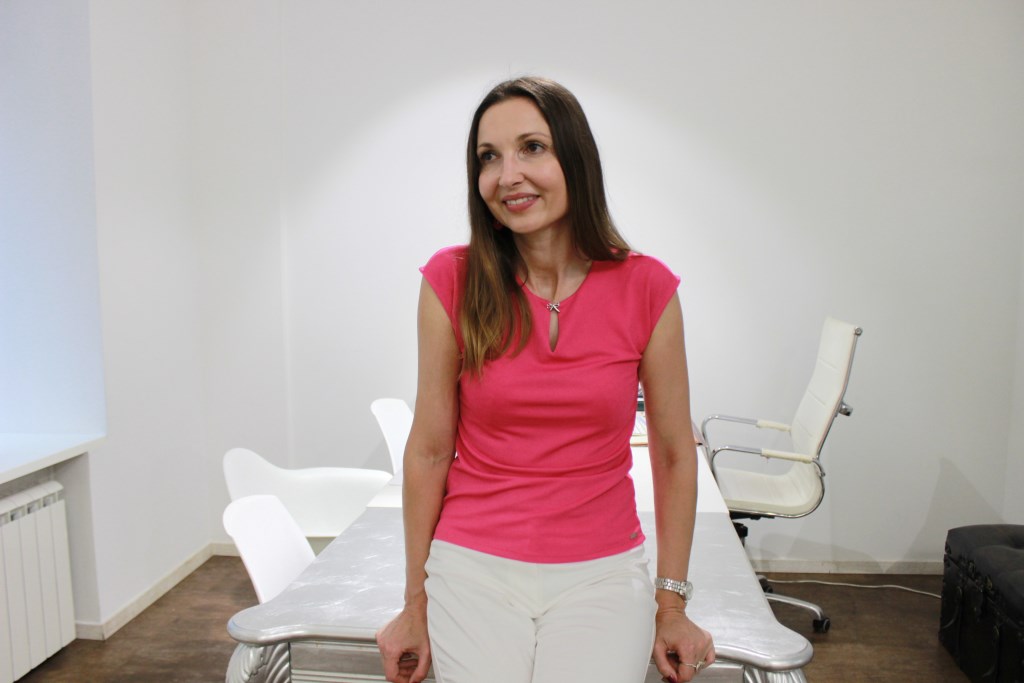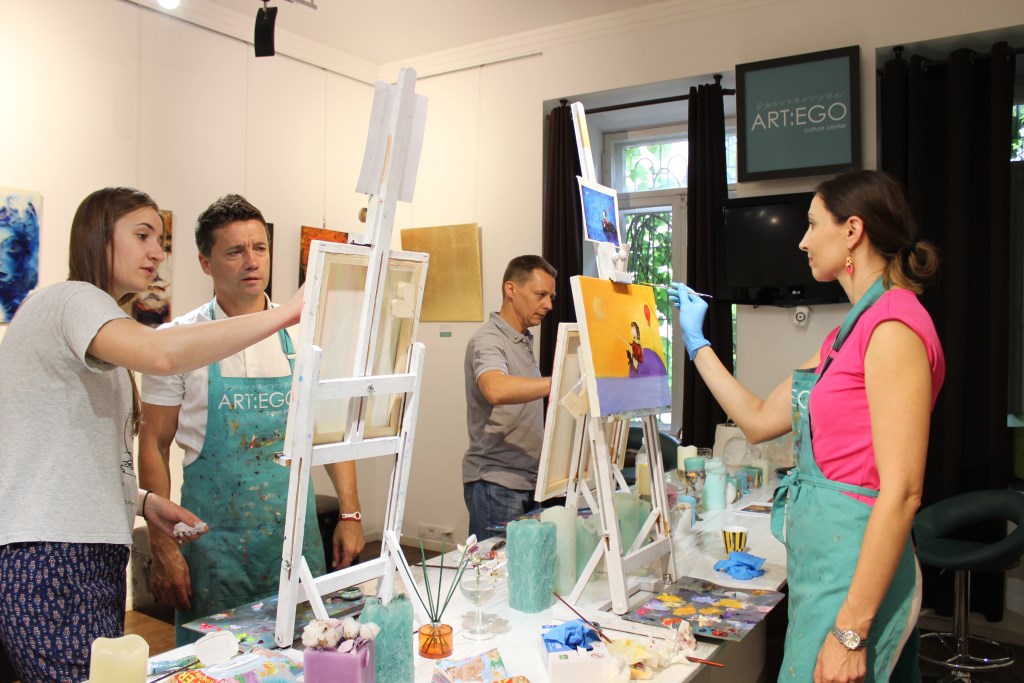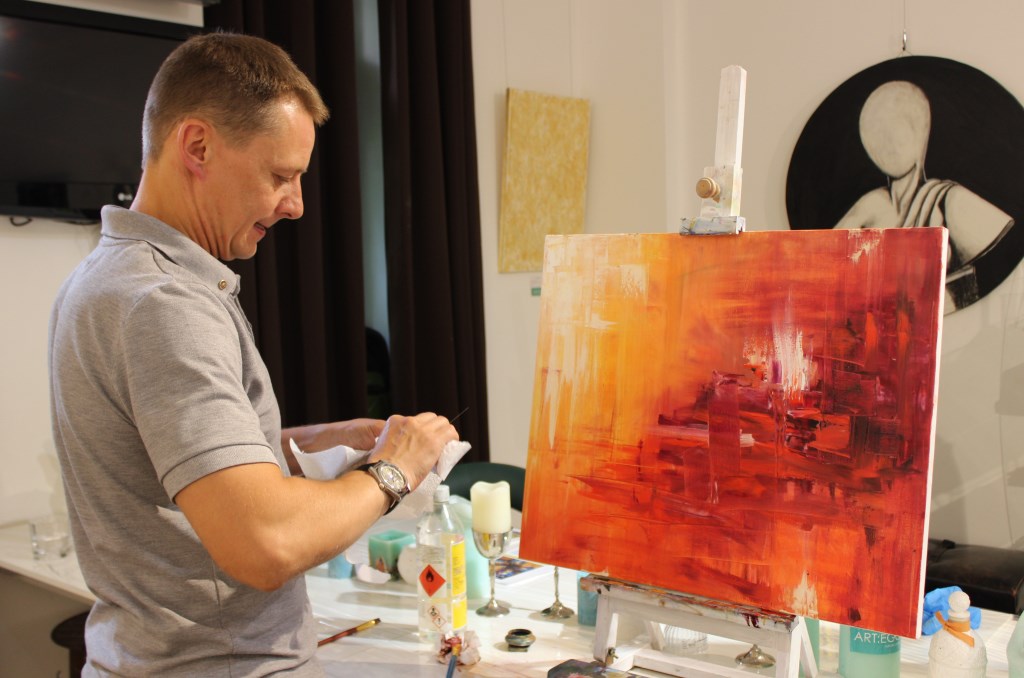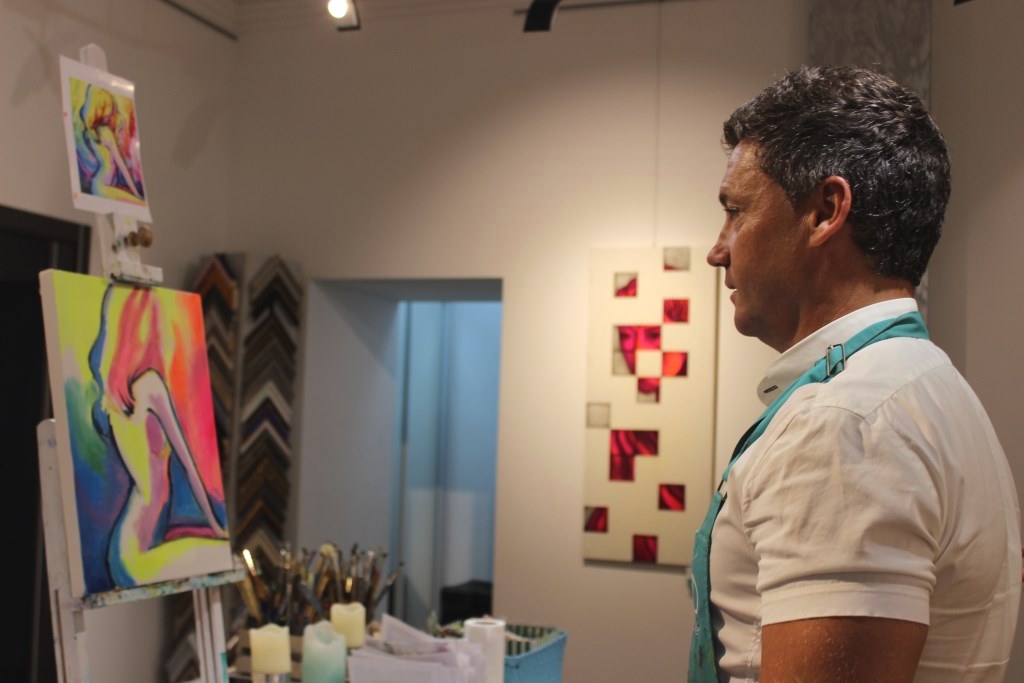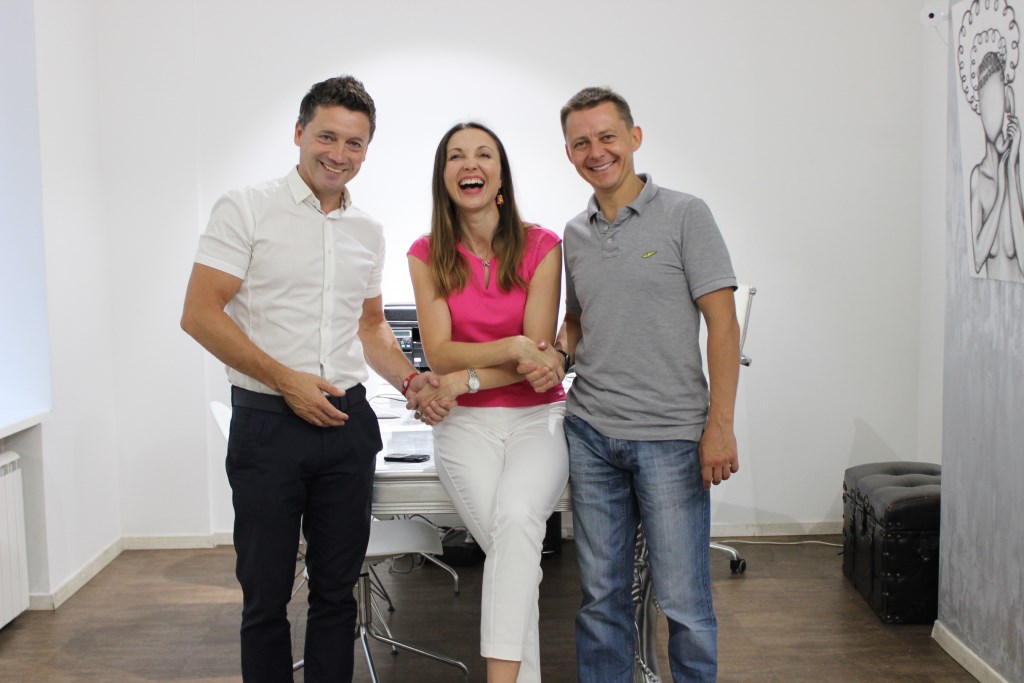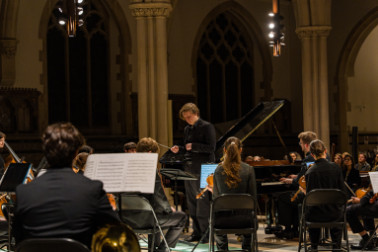Vitaly and Vyacheslav have been successfully working in the Ukrainian market for more than 20 years, developing various directions of the company; the company successfully survived several economic and political crises in the country and set up the highest international standards of development for Ukrainian business.
In 2009, Silvia Krason-Kopaniarz - an experienced top manager - has joined the team. Being a Member of the Board and an operational director in Ukraine in “Impel Griffin”, Silvia participated in the implementation of such complex international projects as Euro 2012 Football Championship in Europe, launch of services for the Chernobyl nuclear power plant, outsourcing in the coal mines in the east of Ukraine, introduction of integrated facilitation services to the Ukrainian market.
Silvia Krason-Kopaniarz
We met with Silvia, Vyacheslav and Vitaly in Spivakovska ART: EGO culture center to talk with the international team of the company about the specifics of doing business in Ukraine, the intricacies of relations between Polish and Ukrainian employees and the prospects of Ukraine as a country with business potential.
It was quite unusual to communicate with successful businessmen in the gallery, while they were painting. But isn’t it the creative and innovative approach that will help you look at everything from a different angle? Moreover, this team has already proved the effectiveness of doing business and, to a great extent, it’s due to its non-standard approach.
Silvia, what were your impressions about Ukraine many years ago, when you came here for the first time? What are your impressions of this country now?
I arrived to Ukraine in 2008, just when the crisis began. The first impression was that no one in Kyiv knew English, and I did not know Russian and Ukrainian and there was communicative collapse :-).To be serious, I’ve thought and still think so far that Ukraine is a very promising country, but it is difficult to foresee when it can realize its full potential. It is the third crisis in Ukraine, as far as I remember. But I do not really connect my actions with crises, although this factor usually forces me to revise the development strategy of any company. I think that in any circumstances you can do something successfully, you just need to be more flexible and adapt to the circumstances. I never had the fear to come to Ukraine, but I had great curiosity. I really like changes and new events in my life.
Partially you built your career in Ukraine. How did that experience affect you from professional point of view?
I think it was very positive. I made some efforts to get into this company, and that company was a very right choice for me. By the way, I myself have sent an email to the General Director of "Impel" in Poland that I am in Ukraine and maybe I can be professionally useful here for this company. A year passed after our first meeting with him and until the beginning of my work in the company. But this expectation was worth it. Here I gained an invaluable experience. I am grateful to Vitaly and Vyacheslav for the fact that they trusted me so much at work when I first started. I took different decisions, but I always felt their support. And this helped me to learn and develop.
What was the most difficult and what surprised you while working in this country?
I'll start with a pleasant thing. I’ve been surprised by the people who live here. Before I started working, I lived in Ukraine for two years and heard from foreign managers different opinions about Ukrainians. Many of them were not very positive about Ukrainian workers. They’ve mentioned that Ukrainians are lazy and non-creative. But when I started working and got acquainted with the managers of “Impel Griffin”, I realized that such reviews were very personal and, in my opinion, were far from being true. If people work well and have good relations, the Ukrainian team is the best I've ever worked with.
Corruption is really negative aspect worth mentioning about. In Ukraine, you face it everywhere, and I believe that this corruption system forcefully limits Ukraine as a country, does not allow it to enter a completely different stage of development and economic success. Although I must add here that the last 3 years I see real attempts to fight with corruption.
Silvia, what features do you consider similar for Poles and Ukrainians, and what differs us so much?
I think that we have a lot of similar things despite the complicated history. We share common Slavic roots, which unite us, and similar languages. This is very noticeable when I see how quickly Ukrainians adapt in my country, those who come to work in Poland. We, Poles and Ukrainians, are very ambitious, but at the same time we love and we are able to have fun. Of course, there are differences, which are especially evident in business relations.
What would you tell and advise those who are just going to visit Ukraine for the first time?
I would say that Ukraine is a very beautiful country with great opportunities and wonderful people. Of course, there are some nuances, but there are problems in any country. There is something to do here, places to see and you can meet very good people and have a good time in this country.
If you ask me in terms of business, I would now say that you need to be careful. I would single out sectors in which it makes sense to invest - for example, the agricultural sector, growing and processing products, but investments in the financial sector involve high risks. We need a serious analytics and understanding how profitable it is in these realities. On the other hand, if you invest during a crisis, you can be sure that sooner or later the crisis will end, and those who are present in the market have a great chance to win.
Vitaly Opanasyuk
Well, I also have a couple questions for the men - the managers of the company. Vitaly and Vyacheslav, while joining the Polish company and thus allowing “Impel Griffin” to be quoted on the Warsaw Stock Exchange, did you realize all the difficulties that you had to go through as businesspeople in Ukraine to meet world standards, but at the same time working in Ukraine in difficult times?
Vitaly: We absolutely did not know what it would be. Together with Polish team we have been working for 8 years, and all this time we have been wondering about the number of demands the exchange commissars have for companies that are listed on the stock exchange. There are a lot of special reports and controls. For the Ukrainian company it is three times harder to meet all their requirements. In the standards of Ukrainian management it is important to make it convenient for the owner, and in the standards of the exchange company – it is strict adherence to exchange requirements, minimum creativity in management. This is very difficult.
Vyacheslav: We live with Vitaly at a time when changes happen throughout our life. There were Perestroika, the collapse of the Soviet Union and then economic crises. We have undergone so many big changes that we have not thought about whether it would be difficult ahead or not. We knew that it was just necessary to do this, uniting our efforts and moving forward without fear.
Did you feel the difference between the mentality of our cultures (Polish and Ukrainian)? Was it simple to negotiate with the Polish side?
Vyacheslav: I’ve noticed from the Polish guys that they are very focused on what they are doing. I asked a simple question 5-7 years ago to the Polish manager: "For example, you have a director doing some wrong report in your office. What will you do?" For him this question was strange. After thinking, he answered me: "Well, this does not happen, he receives money for this. This is his responsibility, his duty." And this is the difference we have. It is even difficult for them to imagine how it is to perform their duties poorly.
Vitaly: When we started, we believed that the Ukrainian and Polish ethnic groups were very close. We thought that that would help us. But in fact, we are all different, we are very different. I do not have experience working with other countries, except for Kazakhstan, but one thing I can say is that we must be able to negotiate. We have different cultures, different business practices, different legacies, completely different approaches. Even terminology of deadlines is different. There were and still are 1000 points, on which you cannot agree at any second. And we need to put a lot of effort to negotiate. The language of numbers and understanding of our goals unite us, as well as some kind of shared energy.
Vyacheslav Reutsky
What was it for two already successful men to accept into their team a businesswoman from another country for a leadership position? How did the team perceive Silvia?
Vitaly: Very important question. By the time we started working with "Impel" in our company there were a lot of women in top management. This was due to the specifics of our activities, which were cleaning services. But at the same time, a business woman and a foreigner is not the same as a hired woman-manager from another country. Here you have to be even more a man and a manager, have to know the business better. And I will not say that it was quite easy. And even after many years I cannot say that it is very simple. No one has canceled the gender issue. Here you need to be careful, considerate, and attentive. It also educates you as a man. It's one thing to finish negotiations in the evening with a stormy booze with vodka, and it's another thing to spend an evening in a non-smoking room with a glass of wine or martini. So it really obliges.
Editor: Or go to the gallery to paint a picture :-)
Vyacheslav: Of course, if such an intelligent and beautiful woman is a partner in business, this only gives you strength. And a woman's view is always a look from another angle, which men really need.
What advice would you give to those entrepreneurs who are just making their first steps in business in this country?
Vitaly: It's important not to become a slave of your business, not to be confused with voluntary slavery. Always be hired in your business, be a manager, not just an owner. I would also advise you to choose partners carefully and treat them honestly. Never lie to partners, no matter what the difficult situation is, we must say everything as it is.
Vyacheslav: Yes, you can try and start a business in another country, it's easier to do it there, but if you decide to do it here, it's important to have patience, perseverance, to be maneuverable in all matters, be open to any changes, to understand that in our country the changes will be very unexpected and you must react quickly to this.
How do you see Ukraine and doing business in it in 10 years?
Vyacheslav: There are two visions - a dreamer’s and a realistic one. Of course, I would like to see Ukraine 10 years later as a successful, economically developed country; we have everything we need for this. But if we do not change the mentality of those who are in charge, then in 10 years little things will change.
Vitaly: I'm a pathological optimist. I know for sure that Ukraine, as a country, has already taken place. I do not know what its borders will be, but the country has already taken place, and this is a tremendous achievement. Ukraine will be an agrarian, grocery boutique at least for Europe, a zone of green food of an ecological direction. Ukraine will be a construction site for the latest technological developments, since no one needs the old infrastructure (and let it rot with the ground, and from scratch it makes sense to build only the newest and most advanced things). And I believe that in certain situations Ukraine will be European Hong Kong; everything goes in this direction; only population with its wrong choice, thoughts about the past, a low level of education and laziness can prevent the country from evolution. But if people read, look to the future, travel abroad, get experience and if they want to live better, vote in elections, not be indexed, then we have a great future, we have everything for this. It's much easier for us than for France, Poland or Russia, we do not need to waste time on destruction of our past, we already have nothing. So we can only create and develop.
Photos by Anna Vishtak
